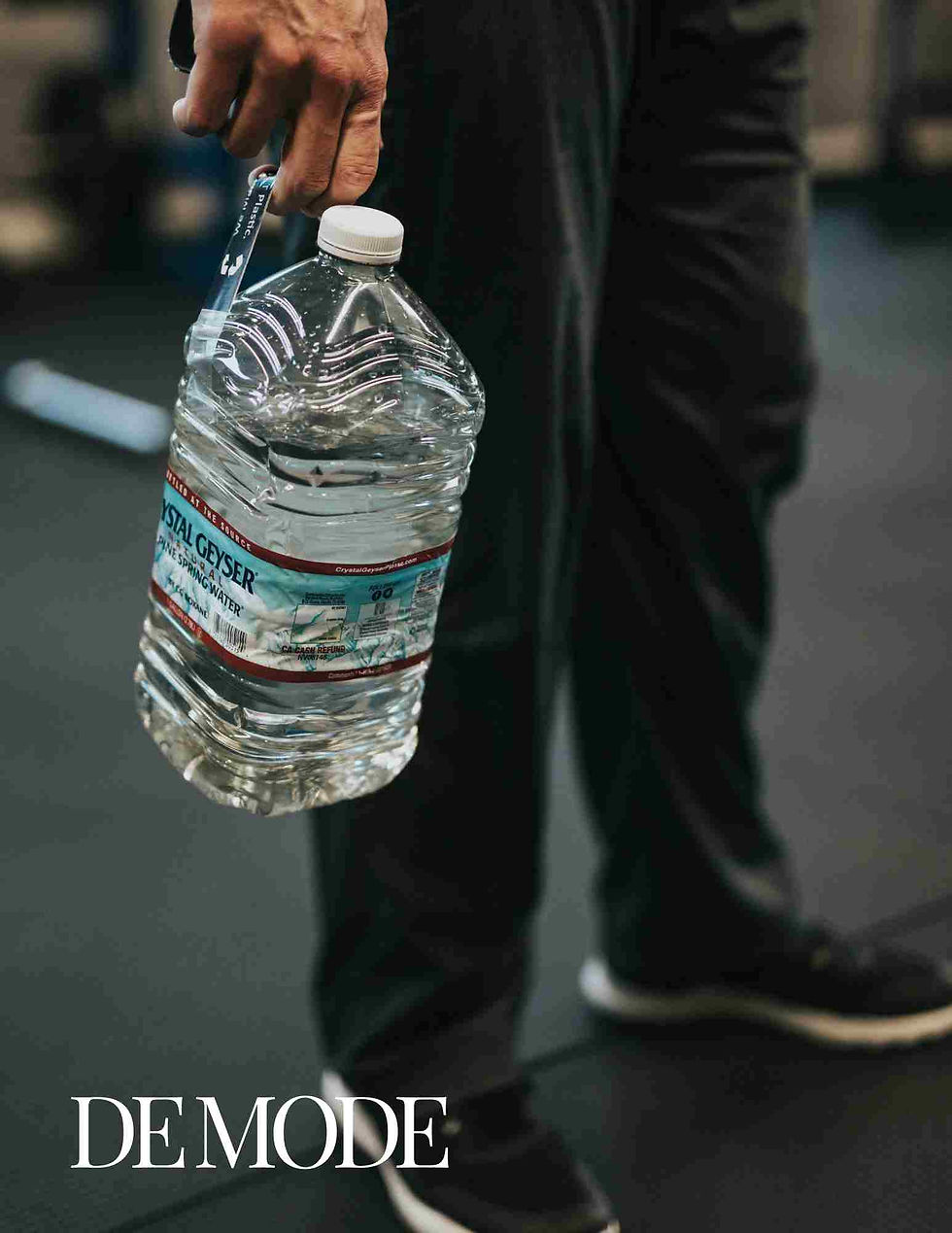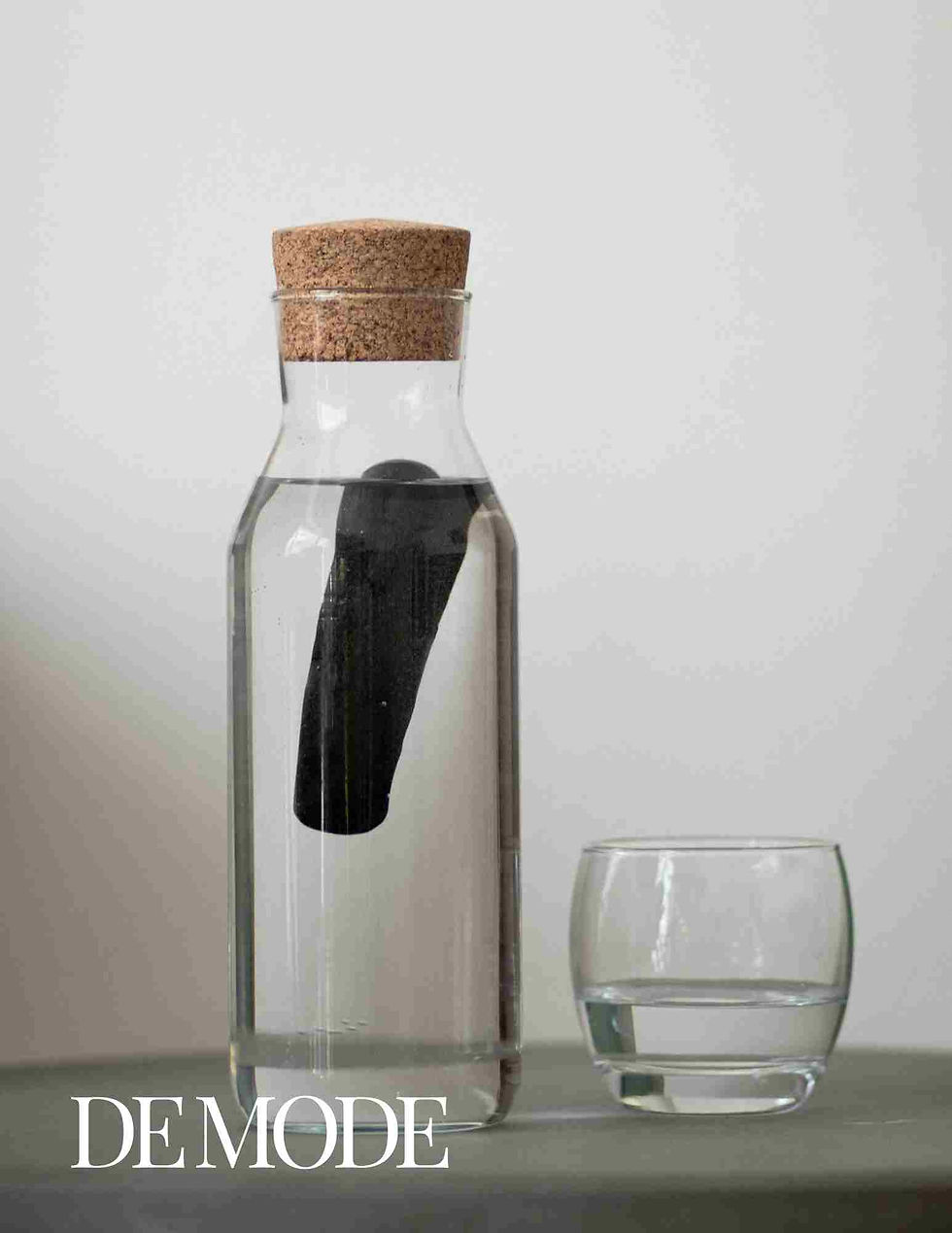ORIGINALLY PUBLISHED IN DE MODE | FITNESS
Article Published on: 05TH OCT 2024 | www.demodemagazine.com
Hydration is often overlooked when it comes to fitness, yet it plays a critical role in enhancing physical performance, maintaining energy levels, and ensuring overall health. Water is a fundamental component of the human body, comprising about 60% of an adult’s body weight, and it’s vital for nearly every bodily function. Whether you're lifting weights, running marathons, practicing yoga, or even engaging in low-impact activities like walking, staying adequately hydrated can be the difference between an effective workout and a physically draining one.
In this article, we will explore why hydration is essential in your fitness routine, the physiological role of water in exercise, signs of dehydration, and how to stay properly hydrated before, during, and after your workout.
The Role of Water in Your Body
Water serves a variety of crucial functions in the human body. It helps regulate body temperature, aids in digestion, transports nutrients to cells, lubricates joints, and supports muscle function. For athletes or fitness enthusiasts, these roles are even more significant as the demands on the body increase during exercise.
When you exercise, your muscles generate heat, causing your body to sweat to cool down. Sweating helps regulate your internal temperature, but it also leads to fluid loss. If this fluid isn't replaced, it can lead to dehydration, which compromises your ability to perform at your best. Dehydration can cause fatigue, dizziness, muscle cramps, and even heat-related illnesses in extreme cases.
Water also supports the cardiovascular system. As your heart rate increases during exercise, your body needs more fluids to maintain blood volume, which helps deliver oxygen to your muscles. Without sufficient hydration, your heart has to work harder to pump blood, which can lead to a decrease in performance and endurance.

Hydration and Physical Performance
Proper hydration is directly linked to athletic performance. Studies have shown that even mild dehydration—losing as little as 1-2% of body weight through sweat—can negatively impact physical performance. This is especially true for endurance sports or high-intensity interval training (HIIT), where maintaining fluid balance is critical for sustaining energy and stamina.
Here’s how hydration benefits various aspects of physical performance:
Endurance: Water helps delay the onset of fatigue by keeping your energy levels up and ensuring your muscles receive enough oxygen. Dehydration decreases endurance, as the body struggles to meet the increased demands placed on it during prolonged or intense workouts.
Strength: Hydrated muscles are able to contract more effectively, allowing you to lift heavier weights or perform more repetitions. When your body is dehydrated, your muscles may feel stiff and cramp more easily, reducing your overall strength.
Cognitive Function: Dehydration doesn’t just affect the body; it also impairs cognitive function. Mental clarity, focus, and decision-making are essential during workouts, especially in activities that require coordination or strategy, such as team sports, weightlifting, or martial arts.
Recovery: Staying hydrated after your workout is essential for muscle recovery. Water helps transport nutrients like amino acids and electrolytes to muscle cells, which aids in repair and growth. It also flushes out toxins and metabolic waste that accumulate during exercise.
Signs of Dehydration
Recognizing the signs of dehydration is key to preventing its negative effects during your fitness routine. Some of the common symptoms include:
Thirst: While it might seem obvious, thirst is a sign that your body is already dehydrated. Try to drink water consistently throughout the day rather than waiting until you’re thirsty.
Dry Mouth: A lack of saliva production can indicate that your body is trying to conserve water.
Fatigue: Feeling tired or sluggish, especially during your workout, may mean you’re not adequately hydrated.
Dizziness or Light-headedness: Dehydration can cause a drop in blood pressure, leading to dizziness or feeling faint.
Dark Urine: If your urine is dark yellow or amber-colored, it’s a sign that your body needs more fluids. Healthy hydration usually results in pale yellow or clear urine.
Muscle Cramps: Loss of water and electrolytes (like sodium, potassium, and magnesium) can lead to painful muscle cramps, especially during prolonged or intense workouts.
How Much Water Should You Drink?
The amount of water you need depends on a variety of factors, including your body weight, the intensity and duration of your exercise, and the environmental conditions in which you’re working out. As a general rule, the average person should aim to drink about 8-10 cups (2-2.5 liters) of water per day. However, when engaging in physical activity, your water intake should increase to accommodate fluid loss through sweat.
A simple way to gauge how much water you need is to weigh yourself before and after exercise. For every pound (0.45 kg) lost during your workout, you should drink about 16-20 ounces (0.5-0.6 liters) of water. This helps replenish the fluids you lost and supports recovery.

Hydration Before, During, and After Exercise
Before Exercise:
It’s crucial to start your workout well-hydrated. If you begin your exercise already dehydrated, your performance will suffer, and you’ll be at a greater risk for heat-related illnesses like heat exhaustion or heatstroke. About two hours before your workout, aim to drink 16-20 ounces of water. Additionally, drinking another 8-10 ounces about 20-30 minutes before you begin exercising ensures your body is primed for the upcoming activity.
During Exercise:
Staying hydrated during your workout is just as important, particularly for exercises lasting more than 30 minutes or in hot and humid environments. Aim to drink about 7-10 ounces of water every 10-20 minutes during exercise. For intense workouts lasting over an hour, you may want to consider a sports drink that contains electrolytes to help replace the minerals lost through sweat.
After Exercise:
Rehydrating after your workout is vital for recovery. This is when your body is replenishing the fluids lost and repairing muscle tissue. Drinking water after exercise not only helps restore fluid balance but also supports the removal of toxins and metabolic byproducts produced during intense physical activity. Aim to drink about 16-24 ounces of water for every pound of body weight lost during your workout.
Electrolytes and Hydration
Electrolytes—minerals like sodium, potassium, magnesium, and calcium—are crucial for maintaining fluid balance in your body. These minerals help regulate muscle function, nerve function, and hydration levels. When you sweat, you lose both water and electrolytes, which can disrupt your body’s fluid balance and lead to dehydration, muscle cramps, or fatigue.
For workouts lasting less than an hour, water is usually sufficient to keep you hydrated. However, if you’re engaging in prolonged or intense activities (like running a marathon or cycling for several hours), you may need to replenish your electrolytes. Sports drinks or electrolyte supplements can help restore these vital minerals and maintain hydration levels.
Hydration Strategies for Different Activities
Different types of workouts place different demands on your body, and hydration strategies should be tailored accordingly:
Strength Training: For weightlifting or resistance training, water is generally sufficient to stay hydrated, as these activities don’t result in excessive sweating. However, it’s still important to drink water before, during, and after your session to support muscle function and recovery.
Cardio: Whether it’s running, cycling, or swimming, cardio workouts tend to cause significant fluid loss through sweat. It’s essential to drink water regularly during these activities and consider an electrolyte-rich sports drink for extended sessions.
High-Intensity Interval Training (HIIT): HIIT workouts are fast-paced and can lead to a lot of sweat in a short amount of time. Make sure to stay hydrated throughout the workout, sipping water between sets to maintain performance and avoid dehydration.
Yoga: For less intense forms of yoga, drinking water before and after the session is typically sufficient. However, for hot yoga or more strenuous styles like Ashtanga, it’s important to stay hydrated throughout the class to replace fluids lost through sweat.

Photo by 21 swan | Source: www.unsplash.com Conclusion
Hydration is a key factor in optimizing your fitness routine and overall health. From regulating body temperature to supporting muscle function and aiding recovery, water plays a vital role in every aspect of physical performance. Understanding your body’s hydration needs, recognizing the signs of dehydration, and following a proper hydration strategy before, during, and after exercise can significantly enhance your workout experience and help you achieve your fitness goals. So, next time you hit the gym or the running trail, don’t forget your water bottle—your body will thank you!